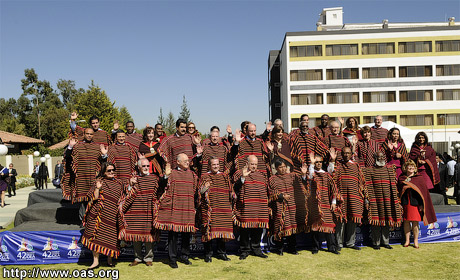The Fate of OAS to be Decided in 2013: Overhaul or Dissolution
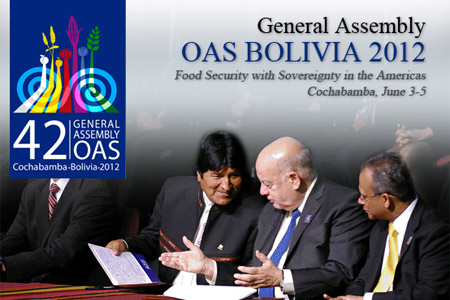
The Bolivarian Alliance for the Peoples of Our America (Alianza Bolivariana para los Pueblos de Nuestra América - or ALBA) had accumulated a real strong potential to reject the OAS, so the most sharp speeches were be expected. Not once the ALBA states have said the OAS bureaucracy acted as told by the Empire, it took decisions meeting its interests while ignoring important initiatives of the Latin America and the Caribbean countries. But the most unacceptable thing is using the organization to exert pressure on the member states that refuse to be Washington’s puppets.
Before the General Assembly’s session started it had come under harsh criticism by President Hugo Chavez speaking in Caracas. He called the organization “worn and archaic”, serving the interests of the USA and ignoring the idea of Latin America’s integration. The Venezuelan leader spoke for the organization’s reform, he said: “if it doesn’t happen we’ll eliminate the OAS”. The President of Ecuador Rafael Correa came personally to take part in the forum, he demanded comprehensive reshaping of the organization and sound thrashing of the bureaucrats enjoying warm places in the OAS structures.
It’s understandable the US State Secretary Hillary Clinton had no wish to be in the epicenter of “Latin American revolt”, so she refused to attend (giving no intelligible explanation). The OAS Secretary General Jose Miguel Insulza said she had “more important things to do”. How should it be understood? Does it mean working out joint approaches to tackling the problems of the Western Hemisphere is not on the US State Department’s priority list? Or whatever happens to the South of Rio Grande it’s not of special importance for Washington? The underlying message of Insulza, expressed with irritation, was clear: the State Department set him up again. He’d have to fend for himself. Roberta S. Jacobson, Assistant Secretary of State for Western Hemisphere Affairs, has no authority whatsoever. Before the US presidential elections Barack Obama wants no public confrontations on the “Latin American stage”. The opposing Republicans will no doubt use the “rebellious mood” to their advantage and say the Democrats lost Latin America giving away one position after another to the “populists” headed by Hugo Chavez and the Castro brothers.
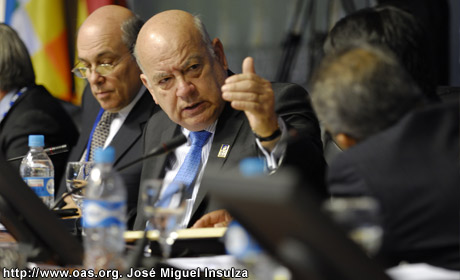
As Insulza had predicted in Cochabamba the representatives of “populist states” vigorously demanded drastic reforms or even dissolution of the OAS, the organization established along the USA defined pattern in 1948 as a regional “political mobilization” structure. At first it was used as a tool in the Cold War with the Soviet Union, then the Soviet bloc states, a bit later with the Cuban revolution. Today it serves the purpose of fighting the “global terrorist threat” and “populist regimes”. The OAS was based on the Inter-American Treaty of Reciprocal Assistance (Tratado Interamericano de Asistencia Recíproca – TIAR).
The 50 years economic blockade of Cuba had its devastating effect on the TIAR. The cruelty of the Empire in relation to a small country, that dared to start a national project of social justice, was too much to be ignored even by right wing conservative regimes. Latin American solidarity prevailed. The UN voting to stop the Island’s blockade is a bright example of it.
The US collaboration (covert and overt) with the UK in 1982 delivered a powerful blow against the basic principles of TIAR. Trying to restore its sovereignty over the islands Argentina suffered a defeat n the Malvinas (Falklands) war. The British expeditionary force received support from the Pentagon. The US special services collected information in Latin America and Argentina itself to bolster the combat actions of their strategic ally. The USA breached all their Latin American obligations concerning “guaranteed defense” from an outside of continent aggression. It shies away from remembering UK warships calling ports “for training purposes” and nuclear submarines clandestine raids in the waters of the Malvinas archipelago.
The ALBA nations statement on pulling out of the Inter-American Treaty of Reciprocal Assistance made at the end of the 42 session of General Assembly was a reaction to dozens of years of the US continental diktat in all spheres: military, energy, finance, trade, economy, politics, ideology. Ecuador’s Foreign Minister Ricardo Armando Patiño speaking in the name of his ALBA colleagues put it flatly: "Our countries have made the decision to bury what deserves to be buried, to throw into the trash what is no longer useful”.
The Inter-American Commission on Human Rights (Comisión Inter-Americana de Derechos Umanas – CIDH) has always been a “leverage” tool used by the USA “to influence” Latin American states, first of all those that belong to the ALBA integration structure. Santiago Canton, its Secretary, an Argentinean by origin, has been an obedient executor of the missions set by the State Department aimed at “disclosing” unfavorable human rights situations in “populist” states. The Commission was adamant in its hostile stance towards Venezuela; in fact it instigated radical opposition to destabilize the situation creating the conditions for a direct US intervention. In the days of April 2002 coup the OAS and CIDH leadership supported the conspirators that were part of a complex plot against the Bolivarian government. The Commission was mostly reproved for being authoritarian, ignoring the decisions of the General Assembly. After 12 years of impeccable service record Canton became such an odious figure for Latin Americans that the State Department had to find him a place under the sun at the Robert Kennedy Foundation.
The 42 session took a compromise decision to reform the Human Rights Commission. The ALBA came out with concrete proposals submitted to the OAS Permanent Council that was responsible for getting all interested parties be involved in a dialogue. In half a year (no later than the first quarter of 2013) the document on the organization’s reform will be submitted to the OAS Extraordinary session of General Assembly for discussion. It’s worth to note Evo Morales emphasized the new Commission would survey the human rights situation on the US soil.
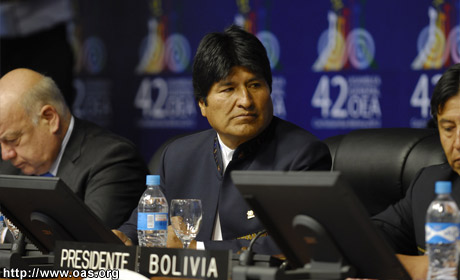
The Assembly didn’t take the probable dissolution issue from the agenda. Talking about the OAS demise at press-conference on June 5 Evo Morales called the USA the main party at fault. Any attempts of Latin American countries to get rid of the diktat meet counteractions on the part of Washington because an OAS supported coup d’etat takes place anytime somebody tries to do it. Morales noted the coup strategy practiced by the Empire started to malfunction. Out of three attempts – in Venezuela, Ecuador and Honduras – only the last one happened to be a success. The plotters overthrew the legally elected President Manuel Zelaya. Morales questioned the OAS reaction, he asked what was done to restore democracy in Honduras. The answer was obvious: nothing done in real terms.
Zelaya returned to the country but he has to go around with reinforced security. Terrorist acts against his supporters, journalists, trade unionists, student and Indian activists have become routine. The activities of “paramitares” and hired hitmen working for drug cartels is encouraged by the regime of Porfirio Lobo and the Honduran militarists. The US embassy and American special services have effective leverage to exercise control over the regime. They don’t try to stop bloodshed: anything would do to prevent Zelaya coming to power again!
The same way terror, clandestinely supported by the USA, is exercised against politicians, journalists, social and political “Bolivian style” reforms supporters in Mexico, Central America states, Columbia, Peru, Paraguay. The hatred that the USA feels against ALBA leaders, independent politicians of the continent who didn’t capitulate faced with threats and blackmail, is fraught with new large scale provocations, plots, killings. It cannot be ignored by objectively thinking Latin American politicians.
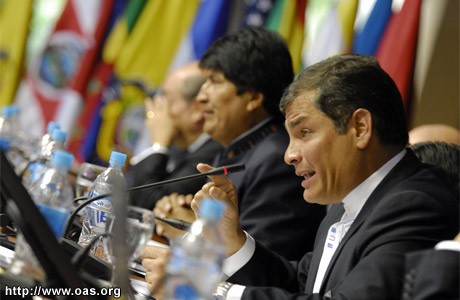
The President of Ecuador R. Correa warned the OAS leadership in the name of OAS that in case there is no overhaul the American countries would initiate the modernization of the continental institutions themselves. He let know that the forces that have defined the policies of Latin America are “losing now” and the US Department of Colonies – the Organization of American States – “owes a lot” to the Latin American peoples. Correa said the situation dictated changes: “If it’s necessary to abandon the OAS and create our own system, then we have to do it.” – he added.
Actually the process has already started. By the end of 2011 The Community of Latin American and Caribbean States (Comunidad de Estados Latinoamericanos y Caribeños – CELAC) was established bringing together 33 countries of the region. The USA and Canada were not invited even as observers.
